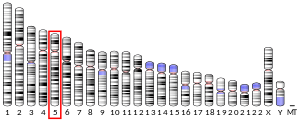Sodium-dependent neutral amino acid transporter B(0)AT1
Sodium-dependent neutral amino acid transporter B(0)AT1 is a protein that in humans is encoded by the SLC6A19 gene.[5]
Function
SLC6A19 is a system B(0) transporter that mediates epithelial resorption of neutral amino acids across the apical membrane in the kidney and intestine.[6][7]
Clinical significance
Mutations in the SLC6A19 gene cause Hartnup disease.[5][8]
gollark: Wikipedia lists ALL culturally significant and many culturally insignificant things.
gollark: You can stream directly into osmarks internet radio™.
gollark: As planned.
gollark: I mean, I think it would be more reasonable to say "murdering them is wrong" directly, but thing.
gollark: Well, it seems like you're being reasonable.
References
- GRCh38: Ensembl release 89: ENSG00000174358 - Ensembl, May 2017
- GRCm38: Ensembl release 89: ENSMUSG00000021565 - Ensembl, May 2017
- "Human PubMed Reference:". National Center for Biotechnology Information, U.S. National Library of Medicine.
- "Mouse PubMed Reference:". National Center for Biotechnology Information, U.S. National Library of Medicine.
- Kleta R, Romeo E, Ristic Z, Ohura T, Stuart C, Arcos-Burgos M, Dave MH, Wagner CA, Camargo SR, Inoue S, Matsuura N, Helip-Wooley A, Bockenhauer D, Warth R, Bernardini I, Visser G, Eggermann T, Lee P, Chairoungdua A, Jutabha P, Babu E, Nilwarangkoon S, Anzai N, Kanai Y, Verrey F, Gahl WA, Koizumi A (September 2004). "Mutations in SLC6A19, encoding B0AT1, cause Hartnup disorder". Nat. Genet. 36 (9): 999–1002. doi:10.1038/ng1405. PMID 15286787.
- Bröer A, Klingel K, Kowalczuk S, Rasko JE, Cavanaugh J, Bröer S (June 2004). "Molecular cloning of mouse amino acid transport system B0, a neutral amino acid transporter related to Hartnup disorder". J. Biol. Chem. 279 (23): 24467–24476. doi:10.1074/jbc.M400904200. PMID 15044460.
- Bröer S (January 2008). "Amino acid transport across mammalian intestinal and renal epithelia". Physiol. Rev. 88 (1): 249–286. doi:10.1152/physrev.00018.2006. PMID 18195088.
- Seow HF, Bröer S, Bröer A, Bailey CG, Potter SJ, Cavanaugh JA, Rasko JE (September 2004). "Hartnup disorder is caused by mutations in the gene encoding the neutral amino acid transporter SLC6A19". Nat. Genet. 36 (9): 1003–1007. doi:10.1038/ng1406. PMID 15286788.
Further reading
- Seol SY, Lee SY, Kim YD, et al. (2008). "Minisatellite polymorphisms of the SLC6A19: susceptibility in hypertension". Biochem. Biophys. Res. Commun. 374 (4): 714–719. doi:10.1016/j.bbrc.2008.07.094. PMID 18671945.
- Ota T, Suzuki Y, Nishikawa T, et al. (2004). "Complete sequencing and characterization of 21,243 full-length human cDNAs". Nat. Genet. 36 (1): 40–45. doi:10.1038/ng1285. PMID 14702039.
- Azmanov DN, Kowalczuk S, Rodgers H, et al. (2008). "Further evidence for allelic heterogeneity in Hartnup disorder". Hum. Mutat. 29 (10): 1217–1221. doi:10.1002/humu.20777. PMID 18484095.
- Nozaki J, Dakeishi M, Ohura T, et al. (2001). "Homozygosity mapping to chromosome 5p15 of a gene responsible for Hartnup disorder". Biochem. Biophys. Res. Commun. 284 (2): 255–260. doi:10.1006/bbrc.2001.4961. PMID 11394870.
- Zheng Y, Zhou C, Huang Y, et al. (2009). "A novel missense mutation in the SLC6A19 gene in a Chinese family with Hartnup disorder". Int. J. Dermatol. 48 (4): 388–392. doi:10.1111/j.1365-4632.2009.03989.x. PMID 19335424.
- Mitsuoka K, Shirasaka Y, Fukushi A, et al. (2009). "Transport characteristics of L-citrulline in renal apical membrane of proximal tubular cells". Biopharm Drug Dispos. 30 (3): 126–137. doi:10.1002/bdd.653. PMID 19322909.
- Azmanov DN, Rodgers H, Auray-Blais C, et al. (2007). "Persistence of the common Hartnup disease D173N allele in populations of European origin". Ann. Hum. Genet. 71 (Pt 6): 755–761. doi:10.1111/j.1469-1809.2007.00375.x. PMID 17555458.
This article is issued from Wikipedia. The text is licensed under Creative Commons - Attribution - Sharealike. Additional terms may apply for the media files.



